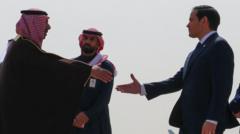As the Trump administration shifts its approach to foreign relations, Taiwan faces a new reality that emphasizes financial transactions over shared democratic values, prompting the island to bolster ties with the U.S. amidst potential tariff threats.**
Taiwan Adapts to New U.S. Dynamics Under Trump Administration**

Taiwan Adapts to New U.S. Dynamics Under Trump Administration**
Taiwanese officials navigate a more transactional relationship with the U.S. as President Trump raises concerns over defense spending and semiconductor dominance.**
Taiwan is reevaluating its diplomatic stance with the United States as it adjusts to a new, more transactional relationship under President Donald J. Trump’s second term. Once viewed as a solid ally due to shared democratic ideals, Taiwan now faces uncertainty about future support, especially as Mr. Trump criticizes its military spending and asserts that it has an unfair advantage in the semiconductor market.
In response, Taiwanese government and business leaders have made efforts to reassure the administration of their commitment to collaboration. Delegations have been dispatched to Washington to display military budget details and engage in discussions about energy partnerships, including potential gas deals. Taiwanese representatives participated in events surrounding Trump's inauguration to strengthen these ties.
There is a growing concern among Taiwanese officials regarding Trump’s intentions toward their semiconductor industry. He has hinted at imposing tariffs on semiconductor imports, raising alarms about the potential relocation of production plants to the United States. Local officials are strategizing on how to mitigate the impact of such tariffs on Taiwanese businesses, recognizing the need to pivot quickly in a shifting geopolitical landscape.
Bonnie S. Glaser, managing director at the German Marshall Fund’s Indo-Pacific program, highlights that many in Taiwan underestimated the potential changes with Trump’s administration. His commentary on military expenditures was a wake-up call, revealing vulnerabilities in their perceived strength of U.S. relations. As these dynamics unfold, Taiwan’s leadership is tasked with navigating this complex terrain to maintain its critical partnership with the United States.
In this evolving relationship, Taiwan will have to balance its defense priorities, bolster its semiconductor industry, and adapt strategies to retain U.S. support amid a backdrop of changing political sentiments.





















